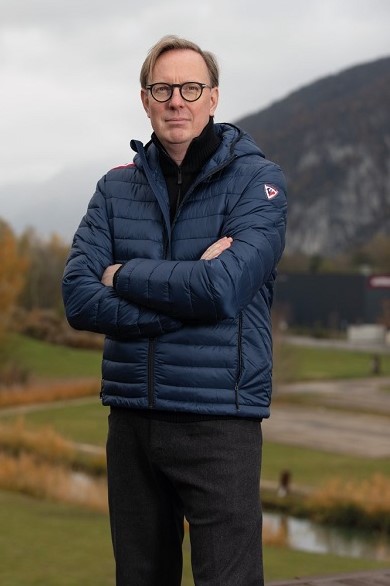Following a challenging 2020-21 winter season, the Rossignol Group is recording a strong rebound for winter 2022 with a 28 percent growth in activity across its portfolio of brands. Celebrating its 115-year anniversary, and strong racing results, the French group aims to accelerate its transformation with commitments toward sustainable development, eco-conscious design, product life cycle and recycling solutions.
Rossignol will launch its recyclable ski in Fall 2022, with the goal of developing one-third of its ski ranges through a sustainable and circular economy approach by 2028.
Following the 2020-21 winter season, wherein ski lifts closed across France and most of Europe, the Rossignol Group has taken advantage of a strong market recovery this year combined with consumer passion for the outdoors and a promising turnout of skiers and riders at resorts worldwide.
Boosted by a positive outlook, the Rossignol Group plans to accelerate the transformation of its business model to incorporate the far-reaching changes throughout the winter sports and outdoor market. The group’s approach encompasses all four seasons, supporting active outdoor enthusiasts and the mountain lifestyle 365 days a year. Focusing on its mountain sport and lifestyle brands, the group is diversifying its offer to deliver multi-season and multi-activity experiences to end consumers around the world.
Representing the embodiment of the mountain lifestyle and ethos, the Rossignol brand has experienced strong growth across its apparel and footwear ranges for 2021-22. Apparel and footwear categories represent 22 percent of the brand’s global annual turnover. Accelerating the brand’s four-season diversification is the launch of the Rossignol mountain bike collection earlier this month and the summer roll-out of its Escaper outdoor story.
The Rossignol Group announced its RESPECT program in 2020, a CSR initiative with targets to reduce its carbon footprint by 30 percent by 2030, and its industrial waste by 40 percent by 2025. Under CEO Vincent Wauters, the company aims to strengthen its environmental and social commitments and place them at the heart of major strategic directions going forward.
Moving forward the group aims to offer more products designed with simplicity in mind to offer greater potential for recyclability at end of the product life cycle. Highlighting this directive is the introduction of the Rossignol Essential ski, designed to be recycled. Available in limited quantities in France in October ’22, the Essential was developed using the simplest and fewest number of raw materials: Eco-design incorporating 62 percent recycled, bio-based and labeled natural materials. Thanks to its exclusive manufacturing process this ski will deliver ultimate recyclability of more than 75 percent. This is a saving of around 10 times more than our classic ski design.
To address current stakes with recycling skis and its responsibility to that end, the group has entered into a partnership with MTB, which has developed a process that enables improved recycling of conventional modern ski constructions, as well as and especially Rossignol’s new Essential ski. As part of a co-development approach.
The process of destroying, material separation, and re-use aim to re-use as much of the material as possible and contribute to a circular economy and product life cycle. Materials could be repurposed in the automotive, garden, or construction industries, and in the future partially re-used in new Rossignol Group products.
Designed by MTB, the Recycling Box is a new tool for recycling skis, boots, and poles and will be operational in 2023.
Rossignol Group wants to make Sallanches, France, site the world’s first recyclable skis factory and a major repair center with the aim of extending the life span of its products. With a focus on a short supply chain, the site will house a complete cycle of production and repair, with recycling operations close to the factory.
By 2028, the company plans to have one-third of its ski ranges made by implementing a circular economy and sustainable approach (increasing use of recycled materials, higher recyclability rate, products that have a lower impact throughout their life cycle). Other products (boots, poles, clothing) also will be designed in the same spirit of simplicity and recyclability.








